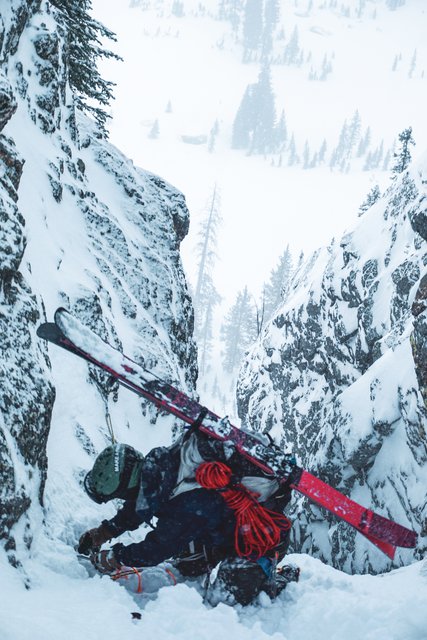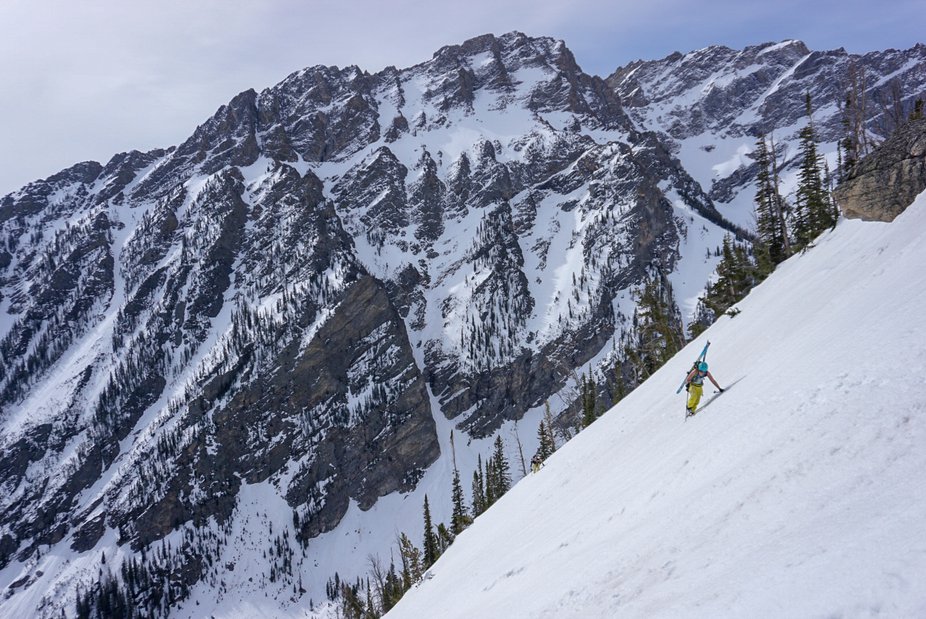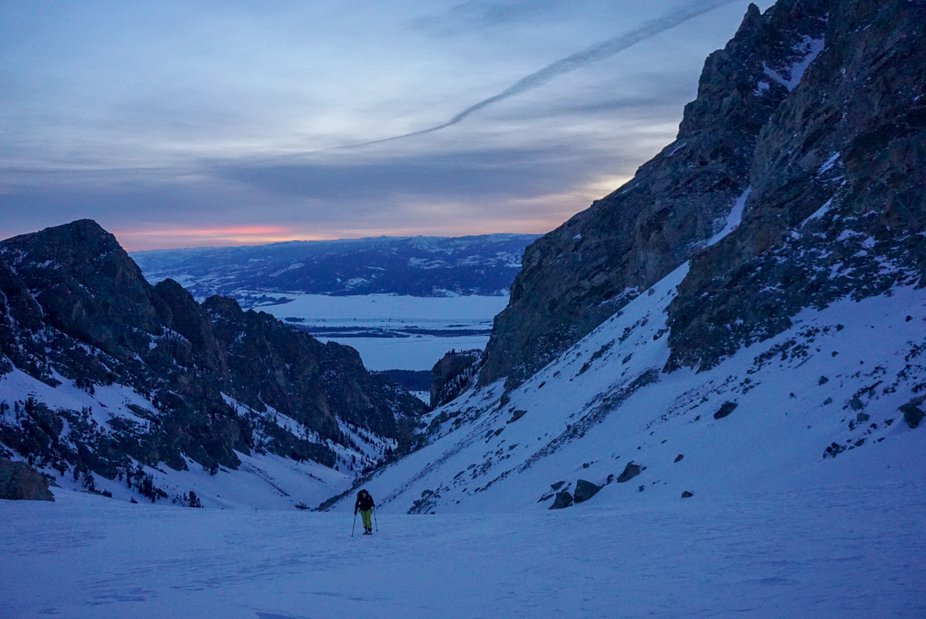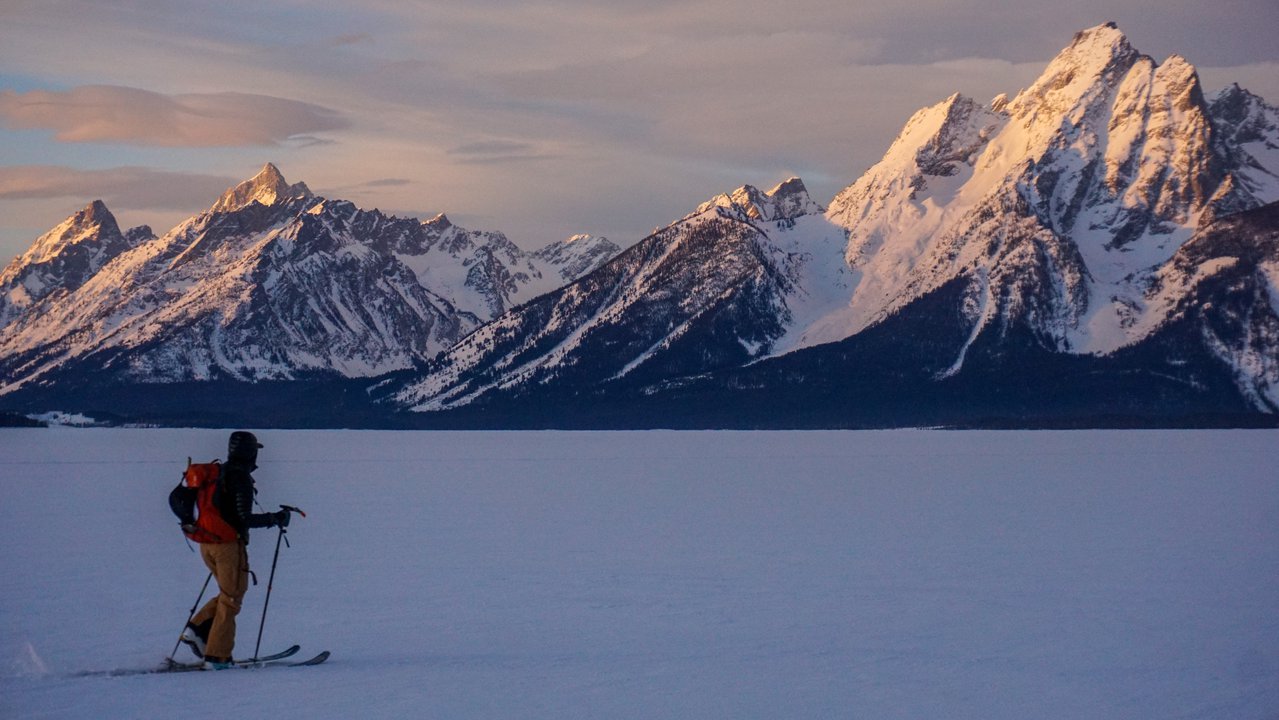Spring snowpack stability has me hankering after bigger lines, longer tours, more consequential days. At the same time though, summery conditions in the valleys have me looking back at the bulk of my backcountry ski season in retrospect, trying to suss out the highlights, evaluate my decision making, and figure out what takeaways from the season will make me a safer, smarter backcountry traveler. And while Newschoolers is a predominantly park-focused website, I like to think that it speaks to all of freeskiing. So whether you’re a seasoned backcountry traveler, or just some kid in Gear Talk trying to decide if you should get Shift or Daymakers, hopefully, there’s something in here for you.
There’s something romantic about the idea of a solo skier pioneering a new line, a lone figure breaking trail in the predawn black, one man with a mission. Ski media slams that trope down our throats every season and it’s hard not to envy that perceived lack of distraction, that self-sufficient sentiment.
But the line between self-reliant, romantic aspirations of mountain conquering, and irresponsible backcountry use is often blurred by predetermined goals and a warped perspective of our own role in the mountains. And it’s important to recognize that as we plan our backcountry excursions.

Skiing with ropes always ups the ante and makes me more liable to make ego-centric decisions
So many of us get wrapped up in our plans and objectives for a ski season. We set measurable goals to complete. In the past I’ve even written it down: “I want to ski X amount of human-powered feet this season” or, “I want to bag these three lines and learn these two tricks.” And that’s great, measurable goals are the first step in progression. But mountains aren’t meant to be “conquered.” Instead, they offer a place to progress, to learn, to fail and grow from it. And goals are an important part of learning. The problem comes when those goals affect our judgment of snow stability and overall safety.
That’s when those objectives can quickly swap from a positive way to foster growth into a dangerous liability that can cloud good decision making. If your goal is to ski as many vertical feet as possible in a single ski season, it’s going to be harder to make the call not to just ski inbounds on a higher avy danger day.
If you’ve got an intense hankering for a specific line, and you’ve been eyeing it all season, it’s hard to make the call not to try for it, even if the weather window is a little tight for comfort or you’re not as strong and healthy as you probably need to be. Setting specific objectives increases our temptation to cut the margins a little too tight. So whenever we set a goal, whenever we make a statement that we can later grade ourselves on, it’s important to set a contingency plan, another goal that’s safer and less consequential that still gives us something to try for even if conditions don’t line up for that initial attempt. A readiness to compromise is essential to safe backcountry travel.

Rapid warming this spring day led to us cutting it a little closer than usual with wet slides.
Often backcountry skiers (especially of the talented, male variety) are tempted to avoid that compromise by adopting a laissez-faire attitude about their own safety. They fancy themselves as solo conquistadors, lone conquerors of epic summits. They’re happy to tell you about all the times they’ve “suffered” through some heinous adventure, “just because it’s there,” emerging from the other side as Great Men. That attitude isn’t grand and powerful though, it’s juvenile, self-centered and reveals a pathetic lack of emotional maturity.
None of us live in a Hemingway novel. Your dehydrated jaunt in Grand Teton National Park does not qualify as “Suffering.” You are not some mysterious, charismatic protagonist in a grand saga. No misunderstood but brilliant and resilient heroes here. And your foolish, life-endangering decisions affect a far greater number of people than your selfish, short-sighted brain can fathom. Grow up.
I used to be there. I used to be a young, single dude in a mountain town, with big objectives, a big ego, and a tiny understanding of the impact of my actions. I know how easy it is to fall into a fatalistic mindset, resigning yourself: “If I perish, I perish.” It’s gratifying, in a masturbatory sort of way, to dramatically let go of everything. It’s easy to just say “If the mountains take me, I’ll greet my death with a stiff upper lip, until then I go hard.” But that’s just not how it works.
Your decisions have an impact on others, even if you’re not skiing with them. Your own risk tolerance can be numbed enough that you ski a big steep face on a high avy day, but that’s not fair to the folks in the drainage who would like to go home to their families. You might have no problem with getting caught in an avalanche over the highway, but the commuters below you will. You might not care if something happens deep in the backcountry and you pass away, but the search and rescue personnel who are putting their lives at risk to rescue you, or recover your body do. Your actions have wide-ranging consequences. A real hero would own them.

The earlier I wake up in the morning to go ski, the more heavily I'm emotionally invested in completing the objective. And carrying axes and crampons further clouds that judgment.
So never let your goals become so inflexible that they cloud your decision making. And never paint yourself as a tragic hero in some epic tale of man against nature. You aren’t, and it’s not worth it. Go skiing with friends, at the very least, carpooling with them will help the parking situation, and they might have some valuable input that makes your day better.
If you really have to go solo, do it knowing that your decisions don’t ever just affect yourself. Make more conservative decisions than you would with a group. Be prepared to spend a night out. Know how to call for help if an emergency does arise (cough...download the Backcountry SOS app...cough). Make a Plan A and a Plan B, and make sure someone you trust knows those plans and knows when you should be back by, and when they should call 911.
We’re all tempted to try to be the sole hero of our life’s story, to paint ourselves as the lone lawman riding into a lawless town, conquering mountains, building oneself into some sort of legend. But when push comes to shove, that kind of selfish view of the world has negative effects that ripple throughout the whole community. You’re better than that. Try acting like it.


Comments